Original Author: Filecoin Network
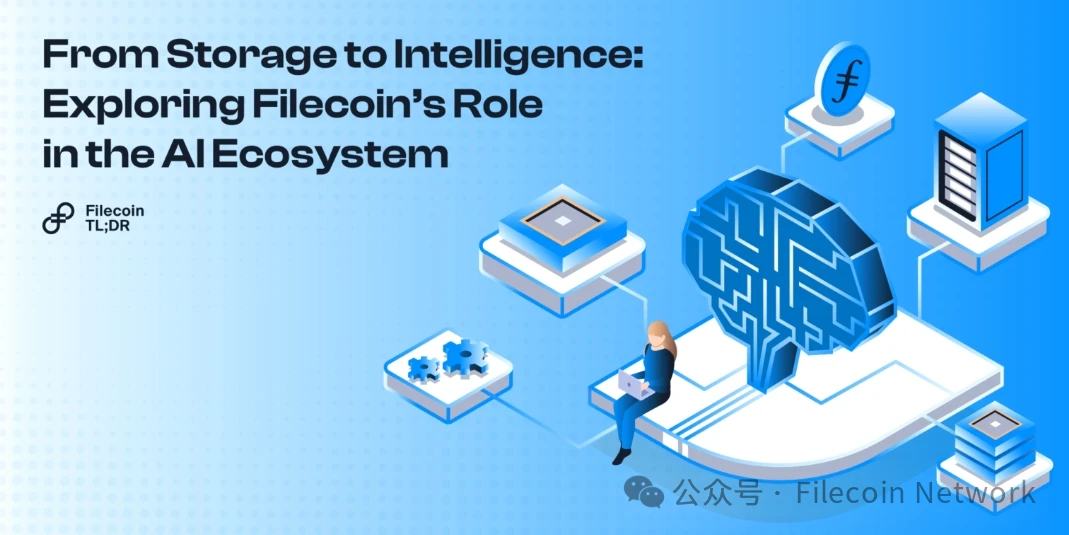
Initially, the integration of artificial intelligence (AI) and blockchain seemed like an awkward buzzword combination, with early adopters often skeptical. However, within just a year, decentralized AI has evolved from a vague concept to the core of conversations in the Web3 environment. This rapid transformation can be attributed to three key factors:
Impact of AI: AI will significantly influence how we interact with the world. As AI agents become increasingly sophisticated, they will manage tasks such as financial transactions and personal coaching. This evolution raises important questions about control and governance in AI development.
Centralization Risks: Centralized AI models controlled by a few tech giants pose serious risks, including bias, censorship, and data privacy issues. This concentration of power stifles innovation and creates vulnerabilities, as seen in recent incidents involving Hugging Face and security breaches.
Demand for Inclusive AI Ecosystems: Decentralized AI offers a pathway to a more equitable and accessible AI landscape by distributing computational processes across various systems. Key advantages include: Lower costs, enabling small developers and startups to innovate in the AI space; Enhanced data integrity, with verifiable data sources increasing the transparency and trustworthiness of AI models; Democratic environment, aligning AI development with market needs to foster a more democratic technological landscape.
These points highlight the value of alternatives to centralized AI.
Decentralized AI Pillars
Decentralized AI comprises three main pillars: leveraging users' idle computing power, utilizing secure decentralized storage, and implementing transparent data labeling.
Decentralized Storage: Utilizing decentralized storage networks like Filecoin to ensure secure and verifiable storage of large datasets.
Decentralized Computing: By harnessing the idle computing power of individual users and distributing tasks across the network, decentralized AI makes AI development more feasible and cost-effective.
Decentralized Data Labeling and Verification: Transparent and verifiable data labeling processes help ensure data quality, reduce bias, and enhance trust in AI systems.
In-Depth Look: Decentralized AI Projects in the Filecoin Ecosystem
To gain a deeper understanding of how the Web3 stack benefits the AI field, we will explore various approaches taken by four decentralized AI projects. These projects are leveraging some or all of the aforementioned pillars of decentralized AI.
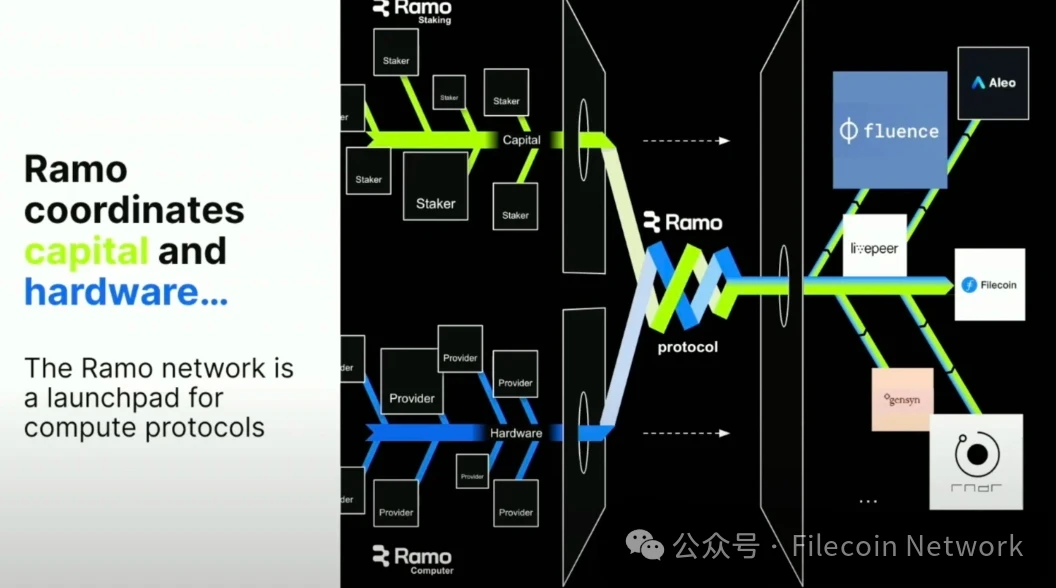
Source: Unlocking Decentralized Storage for AI Workloads and Other Applications - Vukasin Vukoje
(https://www.youtube.com/watch?v=tJ1RfAL-aWY)
Ramo - Simplifying Participation in Decentralized Networks (Funding Stage: Seed Round)
Ramo plays a crucial role in driving AI workloads by coordinating capital and hardware. By merging resources from different providers, Ramo can facilitate the execution of complex tasks such as storage, SNARK generation, and computation, while allowing for cross-network co-funding of hardware resources.
- Multi-Network Tasks: Ramo supports tasks across multiple networks (e.g., reading from Filecoin, processing on Fluence, and writing back to Filecoin), helping to maximize revenue for hardware providers and reduce coordination complexity.
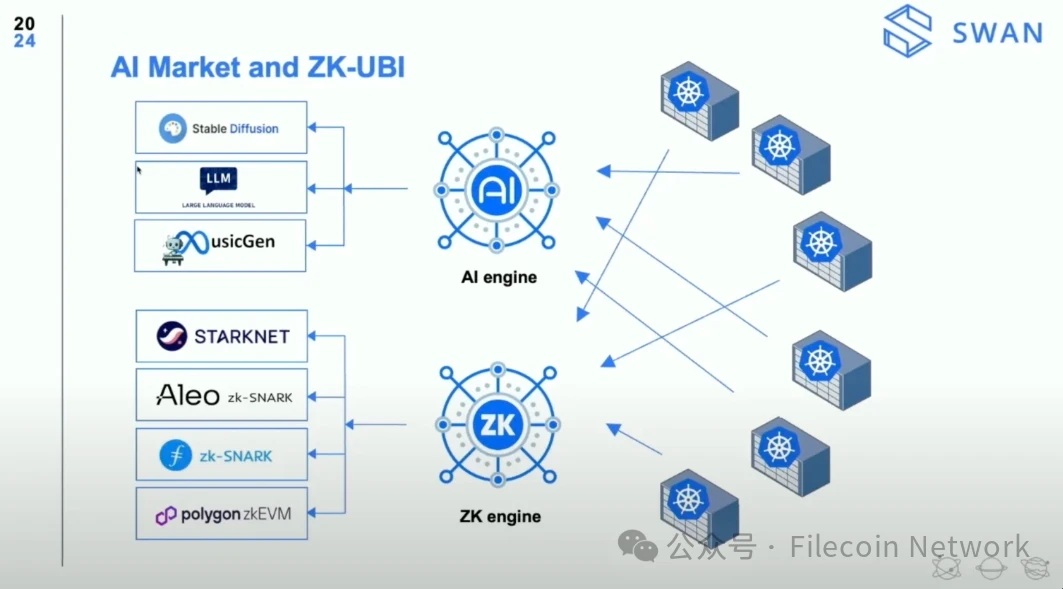
Source: Achieving Decentralized Business Intelligence with Swanchain AI Agents - Charles Cao (https://www.youtube.com/watch?v=Mtl-paq2jEk)
Swanchain - Decentralized AI Training and Deployment (Funding Stage: Seed Round)
Swanchain is a decentralized computing network that connects users with idle computing resources for AI tasks such as model training. Filecoin serves as its primary storage layer, ensuring secure, transparent, and accessible storage of AI data, in line with decentralized AI principles.
Decentralized Computing Marketplace: Swanchain aggregates global computing resources, providing a cost-effective alternative to centralized cloud services. Users can bid on computing tasks, and Swanchain matches them with suitable providers based on demand.
Data Security Storage through Filecoin Integration: Swanchain utilizes Filecoin and IPFS for secure storage of AI models and output results, ensuring transparency and accountability throughout the AI development process.
Support for Various AI Workloads: Swanchain supports a range of AI tasks, including model training, inference, and rendering, such as large language models and image/music generation.
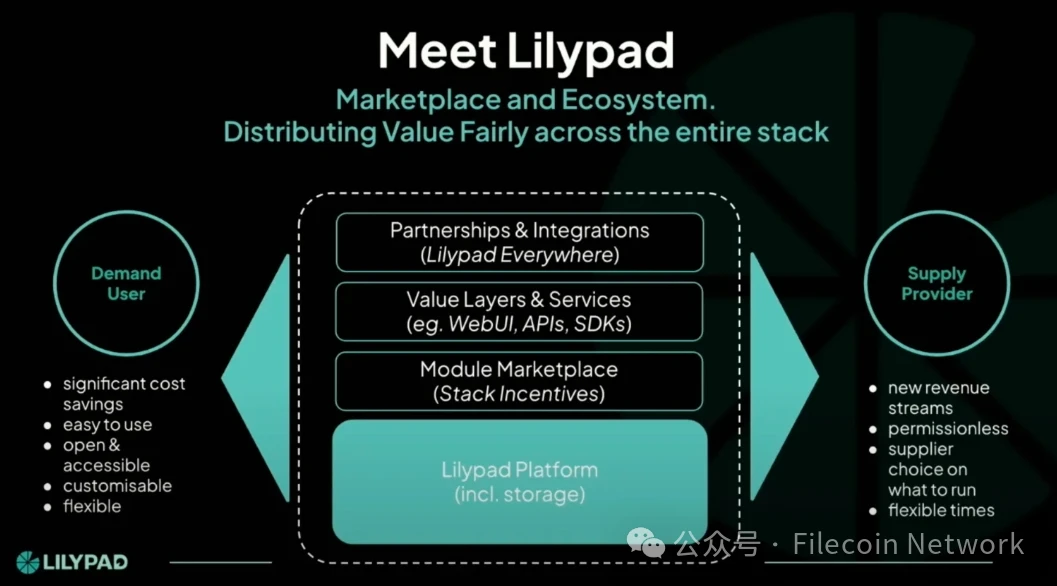
Source: The Role of Open, Verifiable Systems in AI (Filecoin and Lilypad) - Ally Haire (https://youtu.be/8WzMOsgzDjA)
Lilypad - Distributed Computing for AI (Funding Stage: Seed Round)
Lilypad aims to create a trustless distributed computing network that unlocks idle processing power, creating a new market for AI, machine learning, and other large-scale computations. By integrating Filecoin and utilizing IPFS for hot storage, Lilypad ensures secure, transparent, and verifiable data processing throughout the entire AI workflow, supporting an open and responsible AI development environment.
- Task-Based Computing Matching: Lilypad matches user-defined computing requirements (such as GPU type and resources) with providers based on task models, creating a marketplace for developers to share and monetize AI models within the decentralized AI ecosystem.
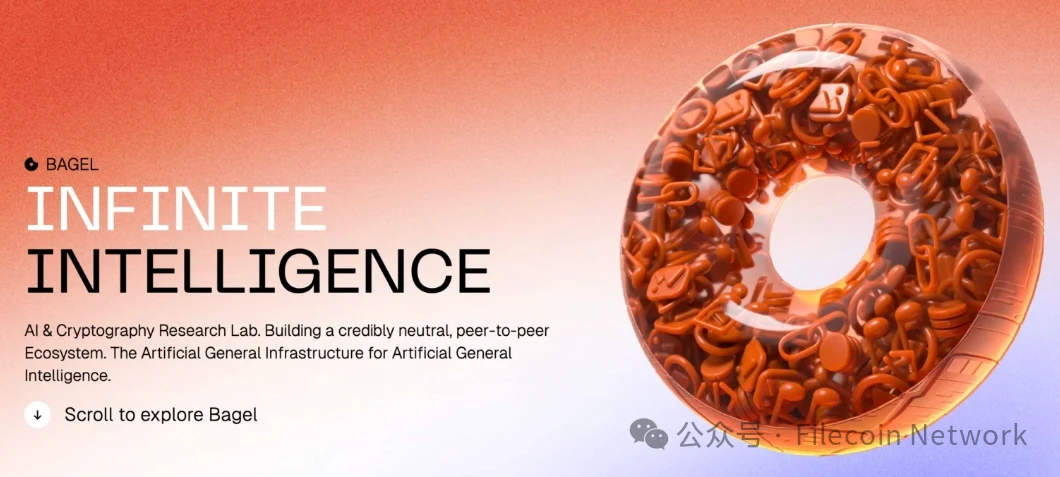
Source: bagel.net (https://www.bagel.net/)
Bagel - AI and Cryptography Research Lab (Funding Stage: Early Seed Round)
Bagel is an AI and cryptography research lab that has created a decentralized machine learning ecosystem, enabling AI developers to leverage the computing and storage capabilities of decentralized networks like Filecoin to train and store models. Its innovative GPU reconstruction technology allows storage providers (SPs) to contribute to both storage and computing networks simultaneously, enhancing Filecoin's utility for AI applications, expanding support for AI developers, and creating new revenue opportunities for SPs.
Increasing Revenue for Filecoin Storage Providers: Bagel helps storage providers monetize their storage and computing resources, increasing their income and incentivizing more network participation.
Optimizing Computing Utilization: Through dynamic routing, Bagel directs GPUs to profitable networks, maximizing efficiency and returns for providers and users.
Summary
The combination of Filecoin and AI marks a significant step forward in technological development. By integrating verifiable storage with computing networks, we can not only address current challenges but also pave the way for future innovations. As these technologies continue to evolve, their impact on AI and other fields will be profound, offering new possibilities for businesses and developers.
If you would like to learn more about Ramo, Swanchain, Lilypad, or Bagel, please click the links below to view the relevant keynote speeches:
Unlocking Decentralized Storage for AI Workloads and Other Applications - Vukasin Vukoje
Achieving Decentralized Business Intelligence with Swanchain AI Agents - Charles Cao
The Role of Open, Verifiable Systems in AI (Filecoin and Lilypad) - Ally Haire
Bagel and Filecoin Foundation Collaborate to Support Decentralized AI Development
If you want to stay updated on the latest developments in the Filecoin ecosystem, please follow the @Filecointldr account or join our Discord.
Special thanks to HQ Han and Jonathan Victor for reviewing this article and providing valuable feedback.
免责声明:本文章仅代表作者个人观点,不代表本平台的立场和观点。本文章仅供信息分享,不构成对任何人的任何投资建议。用户与作者之间的任何争议,与本平台无关。如网页中刊载的文章或图片涉及侵权,请提供相关的权利证明和身份证明发送邮件到support@aicoin.com,本平台相关工作人员将会进行核查。



